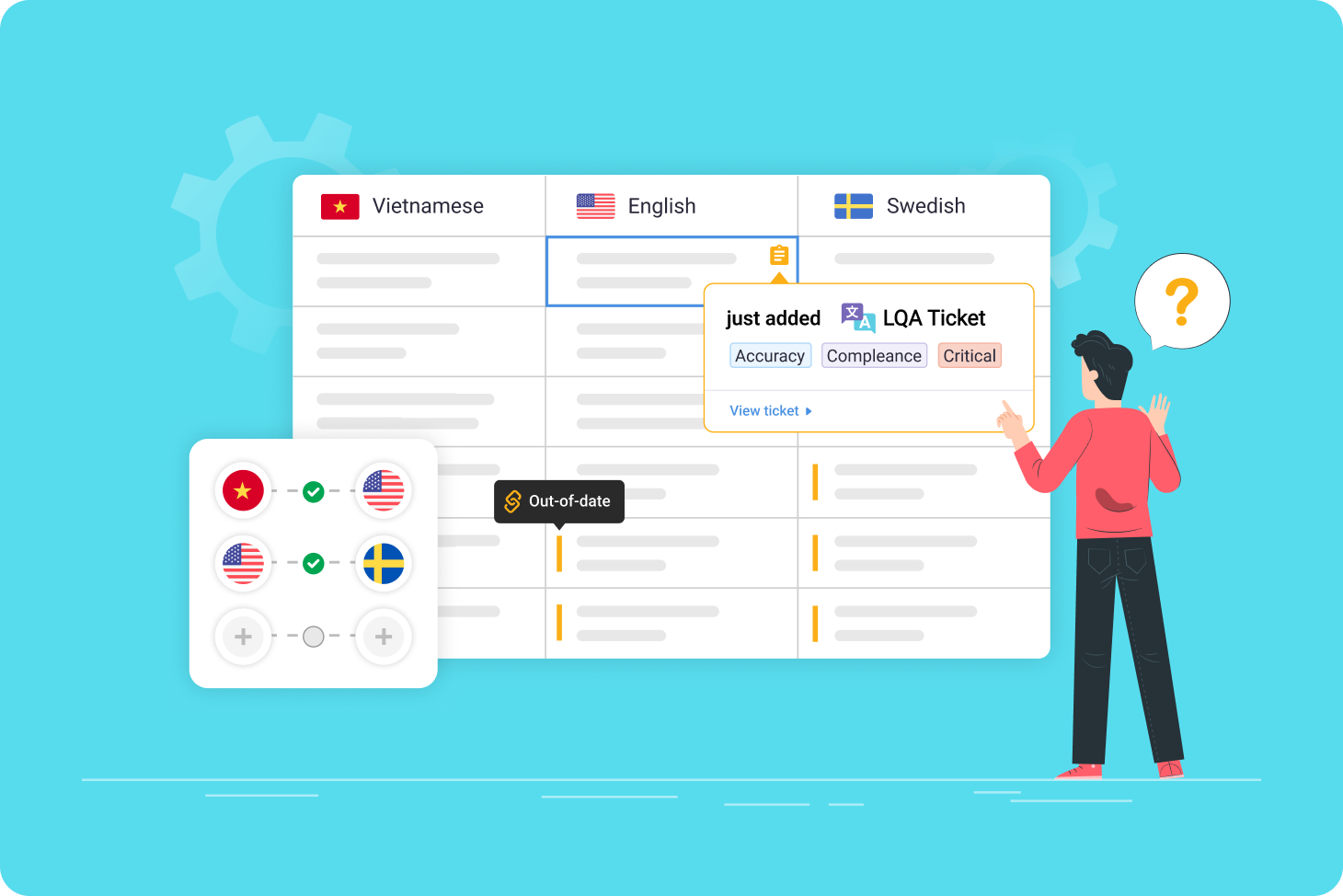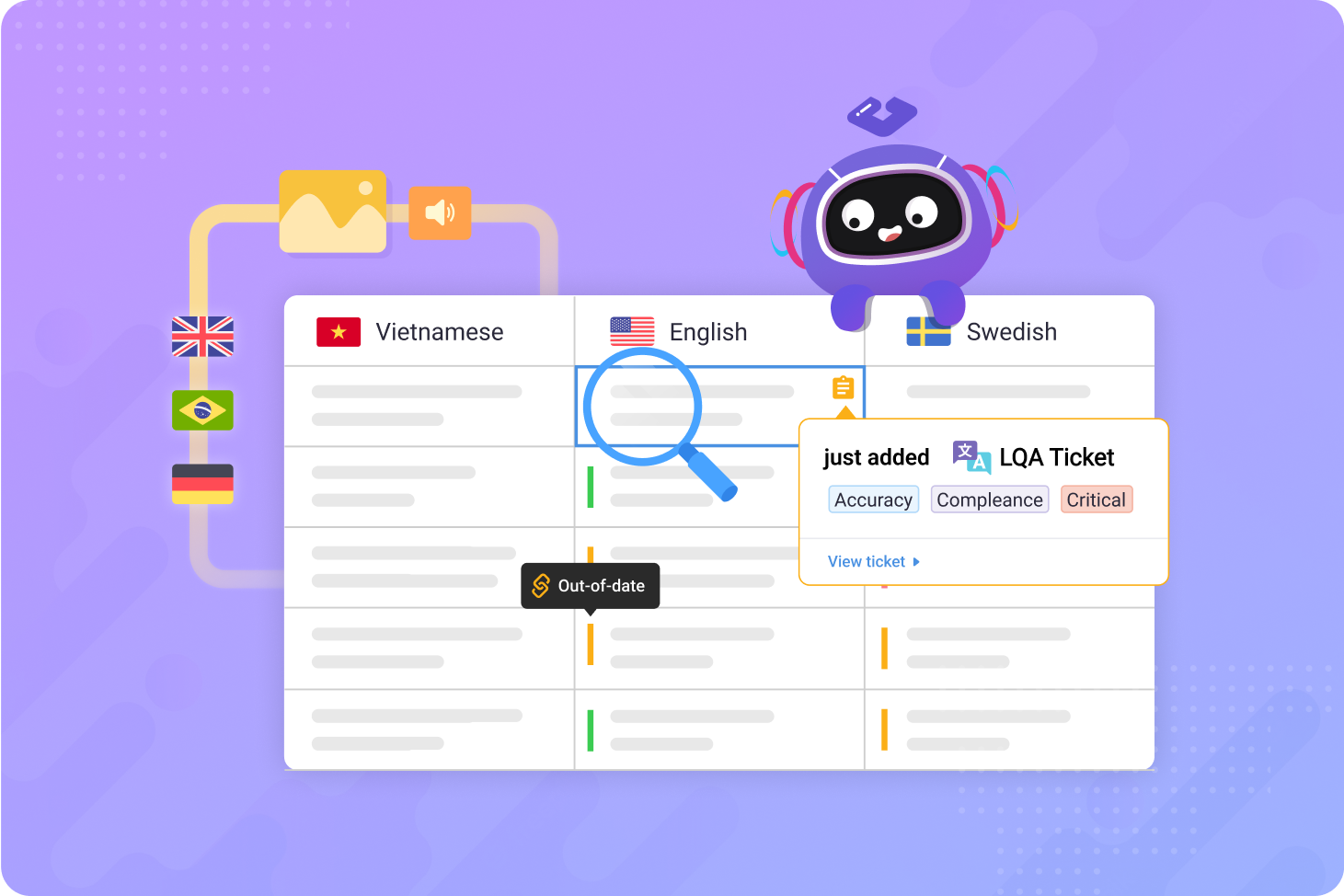Whether budgets are already maxed or deadlines are looming, it can be tempting to breeze past localization QA and assume everything will be fine. But you only get one chance to make a great impression with both current and potential audiences alike.
An effective LQA process weeds out errors while ensuring that your content looks amazing in every market you serve. Learn how to develop an efficient localization QA process to deliver better content faster and delight audiences worldwide — and how a specialized localization content management platform can make it even easier.
>> Learn more about localization QA
1. Implement an agile workflow
Agile is a massive buzzword these days, but what exactly is an agile workflow? Agile work is a big-picture view that divides a project into smaller goals delivered over time, rather than struggling to corral everyone towards one all-encompassing big finish. Agile systems allow teams to work wherever, however, and whenever is best to maximize productivity.
Agile localization workflows incorporate processes and technology that empower everyone to deliver their best work. Centralized project management platforms facilitate flexible, performance-oriented work while also providing a clear progress overview.
Agile localization implements LQA into an ongoing localization process. When localization writers deliver content in frequent batches, quality assessors can save time by checking it immediately without waiting for the entire project to be completed.
2. Make it easy to report bugs
Identify a clear process for reporting issues and obtain buy-in from all team members before proceeding. Make sure testers know how to communicate with localization writers, project managers, developers, or other relevant stakeholders. In Gridly, users can attach tickets to any cell, label and explain the issues, and tag specific team members for follow-up.
To make this even easier, identify issue categories in advance. Common LQA bugs include:
- Grammar mistakes
- Typos
- Cultural conflicts
- Display or layout issues
- Conflicts with brand and style guidelines, localization glossaries, or translation memory
- Poor translations
- Source-language content that hasn’t been translated
3. Use translation memory, localization glossaries, and style guides
Translation memory and localization glossaries are two computer-assisted translation (CAT) tools that help localization writers choose the right language. Meanwhile, a style guide establishes how a content experience should feel through word choice, tone of voice, and more. When used properly, all three can save QA testers a lot of time.
-
Translation memory is a database of previous translations. When identical or similar text appears again, the translation memory will automatically suggest the stored translation. This improves both accuracy and consistency, reducing the chance of mistranslations that will need to be corrected later.
-
A localization glossary contains frequently used words along with their desired translations, and may also include useful context, definitions, and sometimes even specific undesired translations. All this helps localization writers deliver better content before it’s even been checked by QA specialists.
-
Style guides tell writers how to approach their content. Within style guides you’ll often find grammar rules, tone of voice guidelines, and brand-specific terminology. This information helps localization writers align their content with the overall brand or intellectual property.
4. Don’t be afraid to innovate
LQA excellence doesn’t end when you’ve found your preferred tools. If there’s a way to customize those tools to make your process even faster, build it! Investing time up-front towards a better process will pay dividends down the road when you use it over and over again to produce superior results in less time.
Angry Birds developer Rovio did just this when performing LQA for their game Small Town Murders. To keep their UI looking amazing at all times, they realized that their LQA testers would need to check each text string as it appears in the game.
Rovio’s team created a Unity script that leveraged Gridly’s Unity integration by automatically finding each string in the game, capturing a screenshot, then uploading them into Gridly for assessment.
Testers were able to evaluate each string as it appeared in Small Town Murders without having to play through the game or even leave their workspace. And it paid off in spades — this innovation made Rovio’s LQA process four times faster.
By enabling testers to check in-game screenshots directly in Gridly, Rovio made their LQA process both speedier and more effective. The best localization tools can become even better when you shape them to your needs.
>> Learn how to connect Gridly to your favorite tools
Why is LQA important?
Localization QA is important because it ensures a good relationship between your content and your audience around the world. Even the best localization team is likely to miss something, and LQA catches these bugs before your content goes live.
Since localization is all about delivering the most engaging experience possible, being error-free is something to prioritize. Don’t make the mistake of saving LQA for last and running out of time. Instead, empower your team with a streamlined and agile LQA process to make sure everyone encountering your content is as delighted and engaged as possible.
Improve your LQA process with Gridly
The right tools can help you save a ton of time. Gridly is a content management platform designed for localization — and that includes LQA too. Gridly’s specialized localization features can help your team check content both faster and better.
Push and pull content from your games and apps with Unity and Unreal Engine integrations, and link Gridly to CAT tools like Memsource and memoQ with built-in plugins. Take advantage of localization glossaries and translation memories to localize better from the start. And create the LQA workflow that works best for your team with native support for a wide range of proven LQA models.
Ready to streamline your LQA process? Get started with Gridly today.




